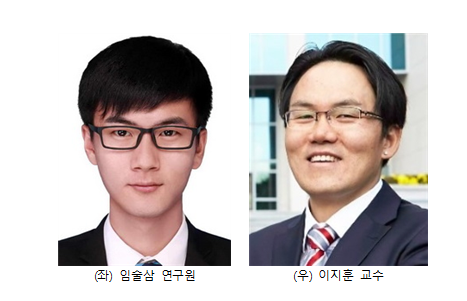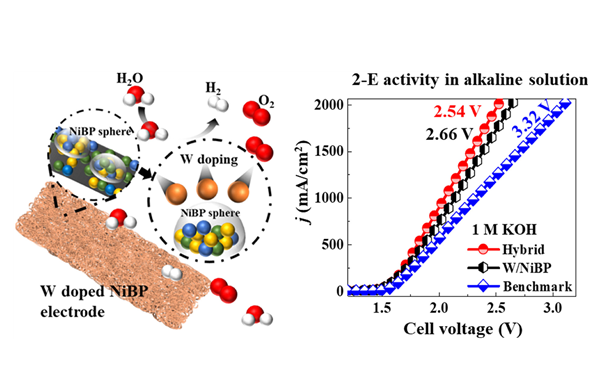Professor Jihoon Lee and His Research Team Develop Xtrinsic Heterotungsten Doping Method
- admin
- 2024-11-29
- 1073
· Prof. Jihoon Lee (Department of Electronic Engineering) and His Research Team Develop Xtrinsic Heterotungsten Doping Method to Improve Intrinsic Electrocatalytic Activity of NiBP Spheres for High-Current-Density Hydrogen Production
72 Views | Created 2024.11.12
| Modified 2024.11.12 | Public Relations Team
·
Professor
Jihoon Lee (Department of Electronic Engineering) and His Research Team Develop
Xtrinsic Heterotungsten Doping Method
To Improve Intrinsic
Electrocatalytic Activity of NiBP Spheres for High-Current-Density Hydrogen
Production
- Paper published in the
internationally renowned academic journal Materials Today Energy (IF: 9.0), by
Elsevier -
Professor Jihoon Lee's research team from the Department of Electronic
Engineering, in collaboration with Sulsam Lim (first author) from the Nano
Device Research Institute,
has successfully achieved a world-first by developing an external Xtrinsic
hetero-tungsten atom doping method to enhance the intrinsic electrocatalytic
activity of NiBP spheres for high-current-density hydrogen production.

In this study, W-doped NiBP electrocatalysts were designed using hydrothermal synthesis and an immersion doping approach for overall water-splitting applications. Xtrinsic heteroatom doping is an effective approach to enhancing the electrochemical performance of electrocatalysts by creating new active sites, improving conductivity, and optimizing adsorption/desorption energies. The W-doped NiBP spheres exhibited overpotentials of 260 mV and 380 mV at 500 mA/cm2 in 1M KOH for the hydrogen evolution reaction (HER) and oxygen evolution reaction (OER), respectively. The bifunctional W-doped NiBP electrode demonstrated excellent 2-electrode water-splitting efficiency, requiring only a low cell voltage of 2.66 V at a high current density (HCD) of 2,000 mA/cm2, significantly outperforming the benchmark Pt/C||RuO2 system. Additionally, it exhibited excellent stability during 120 hours of continuous water-splitting operation without noticeable degradation. The hybrid Pt/C||W/NiBP system demonstrated a further reduced voltage of 2.54 V at 2,000 mA/ cm2. The significant performance improvement can be attributed to the increased active sites for intermediates, enhanced conductivity, and optimized adsorption/desorption energies facilitated by tungsten.

Photo Description: Schematic illustration of the
external tungsten doping approach to enhance the intrinsic electrocatalytic
activity of NiBP spheres for overall water splitting under high-current-density
operation (Materials Today Energy, 2024)
The research team includes Shusen Lin
(Researcher, Kwangwoon University, First Author), Rutuja Mandavkar (Ph.D.
Candidate, Kwangwoon University), Md Ahasan Habib (Ph.D. Candidate, Kwangwoon
University), Mehedi Hasan Joni (Ph.D. Candidate, Kwangwoon University), Sumiya
Akter Dristy (Ph.D. Candidate, Kwangwoon University), Jae-Hun Jeong (Research
Professor, Kwangwoon University, Corresponding Author), and Jihoon Lee
(Professor, Kwangwoon University, Corresponding Author). The study was
conducted exclusively by Kwangwoon University. Researcher Sulsam Lim (Shusen
Lin) joined the integrated master's and doctoral program in the Department of
Electronics at Kwangwoon University in 2019. Currently, he is a postdoctoral
researcher at Kwangwoon University's Nano Device Research Center. He has
participated in various research projects across multiple fields and has
published numerous papers to date. He expressed his aspiration to continue
nurturing future scholars and conducting research at a prestigious university
in his home country, following the announcement of additional outstanding
research achievements during his tenure.
This study was conducted with support from the
Brain Korea 21 Plus (BK-21) program and the Key Research Institutes program,
promoted by the National Research Foundation of Korea and the Ministry of
Education, as well as from Kwangwoon University. The research findings were
published in the scientific journal Materials Today Energy (JCR IF: 9.0) in
November 2024 under the title, "Extrinsic tungsten doping to improve the
intrinsic electrocatalytic activity of NiBP spheres for overall water splitting
under high current density operation." * Publication Web link:
https://doi.org/10.1016/j.mtener.2024.101737
Professor Jihoon Lee's research team is actively
engaged in the development of highly efficient and high-performance
nanomaterials, metasurface-based optoelectronic devices, energy devices, and
system technologies. To date, the team has published over 180 JCR top-tier SCI
papers. Professor Jihoon Lee serves as an Assistant Editor and Editorial Board
member for SCI journals published by globally renowned publishers. He also
holds roles as a Guest Editor for various SCI-level international journals and
serves on multiple committees and organizing teams for international
conferences. In addition, he actively serves as a reviewer for over 30 SCI
journals, including Nano-Micro Letters (IF 31.6) and Advanced Materials (IF
27.4).